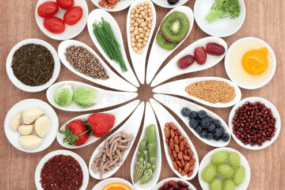
Introduction
In the world of nutrition, myths and misconceptions are rampant. Many of these food myths stem from outdated science, marketing tactics, or simple misinformation that spreads quickly. As a result, people often make dietary choices based on faulty assumptions rather than scientific evidence. In this article, we’ll examine some of the most common food myths and uncover what science truly says about healthy eating.
Myth 1: Carbs Are Bad for You
The Reality
Carbohydrates have been demonized, particularly with the rise of low-carb diets like keto and Atkins. However, not all carbs are created equal. Whole carbohydrates found in fruits, vegetables, legumes, and whole grains provide essential nutrients, fiber, and energy for the body. The real issue lies with refined carbohydrates, such as white bread, pastries, and sugary drinks, which can contribute to weight gain and metabolic disorders.
Scientific Evidence
A study published in The Lancet Public Health found that both low-carb and high-carb diets were linked to shorter lifespans, while moderate carbohydrate intake (50–55% of daily calories) was associated with longer life expectancy. The key is to focus on complex, fiber-rich carbohydrates that provide sustained energy and gut health benefits.
Myth 2: Eating Fat Makes You Fat
The Reality
For decades, dietary fat was blamed for obesity and heart disease. This led to the popularity of low-fat diets, which often replaced fats with sugar and refined carbohydrates, contributing to more health problems.
Scientific Evidence
Research now shows that healthy fats, such as those found in avocados, nuts, seeds, and olive oil, are essential for brain function, hormone regulation, and overall well-being. A study in the New England Journal of Medicine demonstrated that a Mediterranean diet rich in healthy fats significantly reduced the risk of cardiovascular disease compared to a low-fat diet.
Myth 3: High-Protein Diets Are Harmful to Your Kidneys
The Reality
Many believe that eating too much protein damages the kidneys. This concern stems from the fact that individuals with existing kidney disease must limit protein intake.
Scientific Evidence
For healthy individuals, there is no scientific evidence that high-protein diets harm kidney function. A meta-analysis in the Journal of Nutrition and Metabolism concluded that high-protein diets do not negatively impact kidney function in people without pre-existing kidney disease. In fact, adequate protein intake supports muscle growth, metabolism, and overall health.
Myth 4: Microwaving Food Destroys Nutrients
The Reality
Some claim that microwaving food destroys its nutrients, making it an unhealthy cooking method.
Scientific Evidence
Studies show that microwaving is actually one of the best cooking methods for preserving nutrients, especially water-soluble vitamins like vitamin C and B vitamins. A study in The Journal of Food Science found that microwaving preserved more nutrients in vegetables compared to boiling or frying. The key is to use minimal water and avoid overcooking.
Myth 5: Fresh Produce is Always Healthier Than Frozen
The Reality
Many people believe that fresh fruits and vegetables are superior to frozen ones.
Scientific Evidence
While fresh produce is nutritious, frozen fruits and vegetables are often picked at peak ripeness and flash-frozen, preserving their nutrients. A study in the Journal of Food Composition and Analysis found that frozen produce retains its nutritional value as well as, or even better than, fresh produce that has been stored for days.
Myth 6: Detox Diets Cleanse Your Body
The Reality
Detox diets and juice cleanses claim to rid the body of toxins. However, the human body has built-in detoxification systems.
Scientific Evidence
The liver, kidneys, and digestive system continuously work to eliminate toxins. There is no scientific evidence that detox diets enhance this process. Instead, eating a balanced diet rich in whole foods, fiber, and hydration supports natural detoxification better than restrictive cleanses.
Myth 7: Eating Late at Night Causes Weight Gain
The Reality
It is commonly believed that eating after a certain hour leads to weight gain. However, weight gain is more about overall calorie intake and expenditure rather than the timing of meals.
Scientific Evidence
A study in Obesity Reviews found that eating late at night does not inherently lead to weight gain; rather, it is the tendency to consume high-calorie, unhealthy foods late at night that contributes to weight gain. Maintaining a balanced diet and focusing on portion control is more important than meal timing.
Myth 8: Artificial Sweeteners Are Worse Than Sugar
The Reality
Artificial sweeteners are often criticized for being unhealthy and even toxic. While they may not be completely harmless, they are not necessarily worse than sugar.
Scientific Evidence
According to the FDA and World Health Organization, artificial sweeteners such as aspartame and sucralose are safe in moderation. A study in the American Journal of Clinical Nutrition found that replacing sugar with artificial sweeteners can help with weight management and blood sugar control. However, whole food-based natural sweeteners, such as stevia or monk fruit, may be better alternatives for those concerned about artificial additives.
Myth 9: Eggs Are Bad for Your Heart
The Reality
For years, eggs were thought to increase cholesterol levels and contribute to heart disease.
Scientific Evidence
Recent research has debunked this myth. A study in The American Journal of Clinical Nutrition found that moderate egg consumption (up to one per day) does not increase heart disease risk in healthy individuals. Eggs are a great source of protein, vitamins, and healthy fats, making them a nutritious choice.
Myth 10: Organic Food Is Always Healthier
The Reality
Organic food is often marketed as the healthier option, but the truth is more complex.
Scientific Evidence
While organic produce has fewer pesticides, studies show that the nutritional differences between organic and conventionally grown food are minimal. A review in The Annals of Internal Medicine concluded that organic foods do not have significant health benefits over conventional foods. However, they may reduce exposure to synthetic pesticides, which could be a factor for some consumers.
Conclusion
There are countless myths surrounding food and nutrition, many of which have been debunked by scientific research. The key to healthy eating is not about eliminating entire food groups or following extreme diets but rather focusing on a balanced, whole-food-based approach. By staying informed and making decisions based on science rather than misinformation, we can cultivate healthier eating habits that support long-term well-being.























